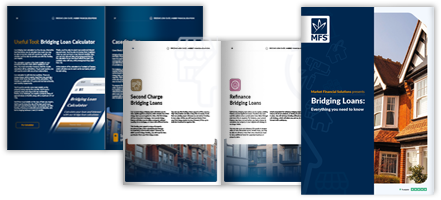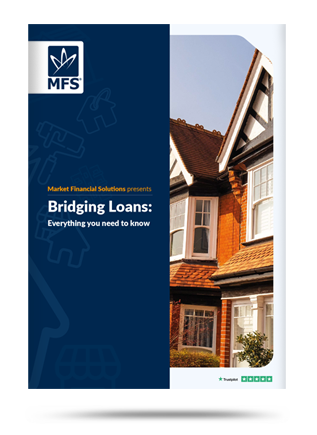Market Financial Solutions are a bridging loan and buy-to-let mortgage provider and are not legal, financial, investment or tax advisers. This document is for informational purposes only and does not, and should not be considered, to constitute legal, financial, investment or tax advice or be relied upon by any person to make a legal, financial, investment or tax decision. Therefore, Investors are encouraged to seek appropriate professional advice. The information in this content is correct at time of writing.

Yes, homeowners and investors alike can have more than one mortgage secured on a property. These additional mortgages, which come from other sources than the original lender[1], are referred to as second charge mortgages.
Investors shouldn’t solely focus on mortgages, however. Various types of loans can be used for second charges, which includes bridging finance.
In fact, second charge bridging loans can provide more flexibility than second charge mortgages, as they can be used for a broad range of purposes. Bespoke second charge funding can help with funding a new business venture, conversions, purchasing a new property, and more.
But, while investors can have two mortgages on one property, they will need to thoroughly assess if doing so is right for their circumstances by using professionals such as Mortgage Brokers and Financial Advisors. Second charge loans/mortgages can be risky for lenders.
This is because initial charges on properties are covered first in the event of a repossession. Second charge lenders would only receive payment once the original loan is covered, running the risk of there being insufficient funds at the end of it all[2].
Given the higher risks involved, the rates available for second charge loans may be more expensive. Also, borrowers need to get permission from their first charge lender before they can take out another charge on an asset. Nevertheless, there are a few circumstances where it can make sense to have two mortgages, or loans, on one property.
Can you have two mortgages on one property? Looking at the pros and cons
Second charge loans can prove useful for those who have a pretty good arrangement at the moment, and don’t want to give it up. By taking out a second charge loan, applicants can keep their existing mortgage deal in place.
This could be especially valuable for those who require finance just as interest rates move upwards[3]. Second charge loans can also be useful for those whose credit rating has gone down as a result of missed payments, CCJs, or other issues. By taking out a second charge, borrowers can avoid extending the term of their current deal, and any remortgaging early repayment charges or penalties.
But, there are some potential challenges that need to be assessed by investors before they progress. Generally, in the mainstream lending market at least, there may be less competition between lenders for second charge loans, when compared to regular mortgages. This may result in fewer options, and fewer bargains.
What’s more, given the risks involved, second charge loans will likely have higher rates than that of their first charge counterparts. Typically, the rates available for second charge loans will sit between 2-3% above the Bank of England base rate[4]. The costs involved can also be affected greatly by the borrower’s time horizon.

Long term vs short term considerations
In the specialist lending market, second charge loans are typically used to cover short term, immediate concerns. Common examples include needing to consolidate debts, raising funds to invest in home improvements, or to purchase a new asset quickly.
But, some second charge mortgages can have terms of up to 25 years[5]. Should borrowers find themselves on these kinds of terms, they could end up paying a lot more in interest over time.
It can also raise the chances of falling behind on repayments. A borrower’s ability to cover the costs now may not be an issue, but it’s hard to know what’ll happen in a decade’s time.
At Market Financial Solutions, our second charge bridging loans have terms of between 3-21 months. All our products are designed to be short term in nature, limiting our borrower’s exposure to potential market challenges, and protracted costs. They’re used for short term property investment plans, and long term exit strategies will need to be in place from the outset.
Investors and brokers are waking up to the utility of second charge loans
Whether a borrower should opt for a second charge mortgage or not will depend on their circumstances. Even so, these products are proving popular with property investors and borrowers.
Searches for second charge mortgages rose by 14% year-on-year in 2023[6], with debt consolidation being a specific motivator. Also, despite a slowdown over the last year or so, the number of new second charge agreements rose by 2% in January, marking the second consecutive month of growth[7].
There is also evidence that brokers are recognising the benefits of second charge loans for their clients[8]. In recent months, many brokers have ventures into the second charge world for the first time.
We’re here for any broker, or direct borrower, who wants to explore their second charge options. Our second charge funding, along with all our specialist loans, can be issued within three days, all the while remaining flexible for our borrowers. We also have refinancing options, and complex loans available to accommodate those with truly unique circumstances.
Our underwriters will be there for brokers and property investors alike from day one. We’ll do our best to match all our clients with appropriate finance solutions.
The Complete Guide to
Bridging Loans
Everything you need to know
- Different bridging types
- Useful tools
- Apply them in real life
- Market insights & more
[1] https://www.moneyhelper.org.uk/en/homes/buying-a-home/second-charge-or-second-mortgages
[2] https://www.charcol.co.uk/news-and-opinions/ask-the-mortgage-experts/two-mortgages-on-one-property-5003/#:~:text=Yes%2C%20it%20is%20possible%20to,second%20mortgage%20or%20second%20charge
[3] https://www.moneysupermarket.com/mortgages/second-charge/
[4] https://www.onlinemortgageadvisor.co.uk/second-charge-mortgages/second-charge-buy-to-let-mortgage/#typical-interest-rates
[5] https://www.comparethemarket.com/mortgages/content/second-mortgage/
[6] https://www.financialreporter.co.uk/second-charge-mortgage-searches-up-14-in-2023.html
[7] https://www.mortgagestrategy.co.uk/news/second-charge-loans-up-in-january-but-down-for-12-month-period/
[8] https://www.mortgagestrategy.co.uk/analysis/second-charge-watch-a-great-start-to-the-year/





